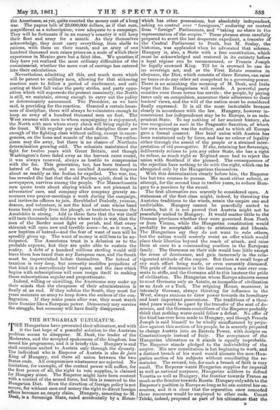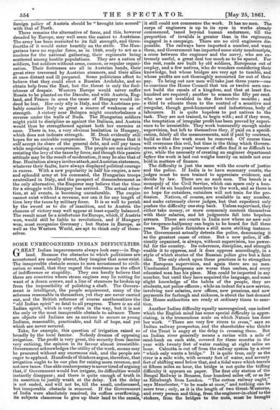THE HUNGARIAN ULTIMATUM.
THE Hungarians have presented their ultimatum, and with it the last hope of a peaceful solution to the Austrian problem seems to disappear. M. Desk, the leader of the Moderates, and the accepted spokesman of the kingdom, has issued his programme, and it is briefly this. Hungary is and shall continue united to Austria only through the dynasty. The individual who is Emperor of Austria is also de jure King of Hungary, and there all union between the two States ends. All compromises whatsoever are rejected. No limitation, for example, of the central power will suffice, for the first power of all, the right to vote supplies, is claimed for Hungary alone. The Emperor might have been content with a control of the armed force, but this is reserved to the Hungarian Diet. Even the direction of, foreign policy is not secure, for without men and money the right to direct foreign affairs becomes an empty claim. Hungary, according to M. Deak, is a Sovereign State, ruled accidentally by a. House which has other possessions, but absolutely independent, asking no control over " foreigners," enduring no control from "foreign" _Parliaments, and "taking no share in the representation of the empire." These phrases seem carefully prepared to avert the last desperate expedient, a transfer of the Central Parliament to Pesth, but M. Szalay, the historian, was applauded when he advocated that scheme. Hungary is, also, a State with a free constitution, which must be acknowledged and restored in its entirety before a legal regime can be recommenced, or Francis Joseph be legally crowned King. Till he is crowned he can do no sovereign act; and as the First Estate remains in abeyance, the Diet, which consists of three Estates, can raise no taxes or do any other act competent to a governing power. There is no mistaking the meaning of M. Deak, and little hope that the Hungarians will recede. A powerful party consider even these terms too servile : the people, by paying taxes only on compulsion, announce their adherence to their leaders' views, and the will of the nation must be considered finally expressed. It is all the more immutable because clearly in accordance with the laW. Hungary, however in- convenient her independence may be to Europe, is an inde- pendent State. To say nothing of her ancient history, she was recognized as such in the Pragmatic Sanction, of which her own sovereign was the author, and to which all Europe gave a formal consent. Her brief union with Austria has been maintained only by force, and has no colour of legality either through the assent of the people or a strained inter- pretation of old prerogative. If she, retaining her Sovereign, deliberately refuses to join any other State, she has a right to refuse, as much right as England once had to reject the union with Scotland if She pleased. The consequences of the rejection have nothing to do with the right, which can be abrogated only by the Hungarians themselves.
With this determination clearly before him, the Emperor has but two courses to pursue. He must either submit, or attempt, for the second time in twelve years, to reduce Hun- gary to a province by the sword.
The first alternative can scarcely be considered open. A statesman of the first class might, indeed, by throwing the Austrian traditions to the winds, retain the empire one and undivisible. Hungary cannot be peacefully united to Austria, but it is not proved that Austria might not be peacefully united to Hungary. It would matter little to the German provinces whether they were governed from Pesth or from Vienna, while the Hungarian constitution would probably be acceptable alike to aristocrats find liberals. The Hungarians say they do not want to rule others, but the nation would scarcely resist an offer which would place their liberties beyond the reach of attack, and raise theni at once to a commanding position in the European family. The Germans on their side would lose little except the sense of dominance, and gain immensely in the rein- vigorated attitude of the empire. But there is small hope of any such effort being made, or even earnestly discussed. The pride of dominance is the last emotion a race ever con- Bents to stifle, and the Germans add to this hauteur the pride of civilization. The Hungarian whom Europe admires seems to most Germans only an Asiatic, as incapable of civilization as an Arab or a Turk. The reigning House, moreover, is intensely German, always thirsting for influence in the West, always anxious to draw power towards its hereditary and least important possessions. The traditions of a thou- sand years would be upset by the transfer of the seat of do- minion, and the German councillors of the Emperor probably think that nothing worse could follow a defeat. No offer of the kind has ever been made to Hungary, and though Francis Joseph is said himself to be wholly uninfluenced by preju- dice against this section of his people, he is scarcely prepared to change Austria into an Eastern Power, with designs on Constantinople instead of Italy. The acceptance of the Hungarian ultimatum as it stands is equally improbable. The Emperor stands pledged to the indivisibility of the empire. His new constitution is but beginning to work, and a distinct breach of his word would alienate the non-Hun- garian section of his subjects without conciliating the re- mainder. The reward, too, for such a breach of faith is very small. The Emperor wants Hungarian supplies for imperial as well as national purposes, Hungarian soldiers to defend Venetia as well as Hungary, the frontier towards France as much as the frontier towards Russia. Hungaryonly adds to the Emperor's position in Europe so long as he can control her re- sources, and it is clear that the separation once conceded those resources would be employed to other ends. Count Teleki, indeed; proposed as part of his ultimatuth that the foreign policy of Austria should be " brought into accord" with that of Pesth.
There remains the alternative of force, and this, however dreaded by Europe, may well seem the easiest to Austrians. The army has been recruited to its full strength, and three- fourths of it would enter heartily on the strife. The Hun- garians have no regular force, as in 1848, ready to act as a nucleus for the national gathering, their regiments being scattered among hostile populations. They are a nation of soldiers, but soldiers without arms, cannon, or regular organi- zation. Their fortresses are all in Austrian hands, their great river traversed by Austrian steamers, and their allies at once distant and ill prepared. Some politicians affect to believe that they could elect a Russian Archduke, and so obtain help from the East, but the .threat is only the fool- ishness of despair. Western Europe would never suffer Russia to be planted on the Danube, and with Austria, Eng- land, and France in arms the cause of Hungary would in- deed be lost. Her only ally is Italy, and the Austrians pro- bably consider Italy as great a source of weakness as of strength. A victory near Bologna might counterbalance a reverse under the walls of Buda. The Hungarian soldiers might yield to discipline as against the Italians, and Austria would thus be strengthened against both her enemies at once. There is, too, a very obvious hesitation in Hungary, which does not indicate strength. M. Deal evidently still hopes for an amicable compromise. The Diet agrees that it will accept its share of the general debt, and will pay taxes while negotiating a compromise. The people are not actively resisting the levy of the taxes by force, and though this passive attitude may be the result of moderation, it may be also that of fear. Hesitation always invites attack, andAustrian statesmen, whatever their faults, have always displayed political courage in excess. With a new popularity in half his empire, a new and splendid army at his command, the Hungarian troops neutralized in Italy, and the prospect of dismemberment as the only alternative, the Emperor may believe that the time for a struggle with Hungary has arrived. The actual situa- tion, at all events, is becoming unendurable. The empire cannot exist without a revenue, nor can it for any length of time levy the taxes by military force. It is as well to perish by the sword as to die of inanition, and to Austria the chances of victory may well appear at least equally balanced. The result must be a misfortune forEurope, which, if Austria won, would still be liable to revolutions, and if Hungary won, must reorganize Germany ; but States in Europe, as well as the Western World, are apt to think only of them- selves.































 Previous page
Previous page